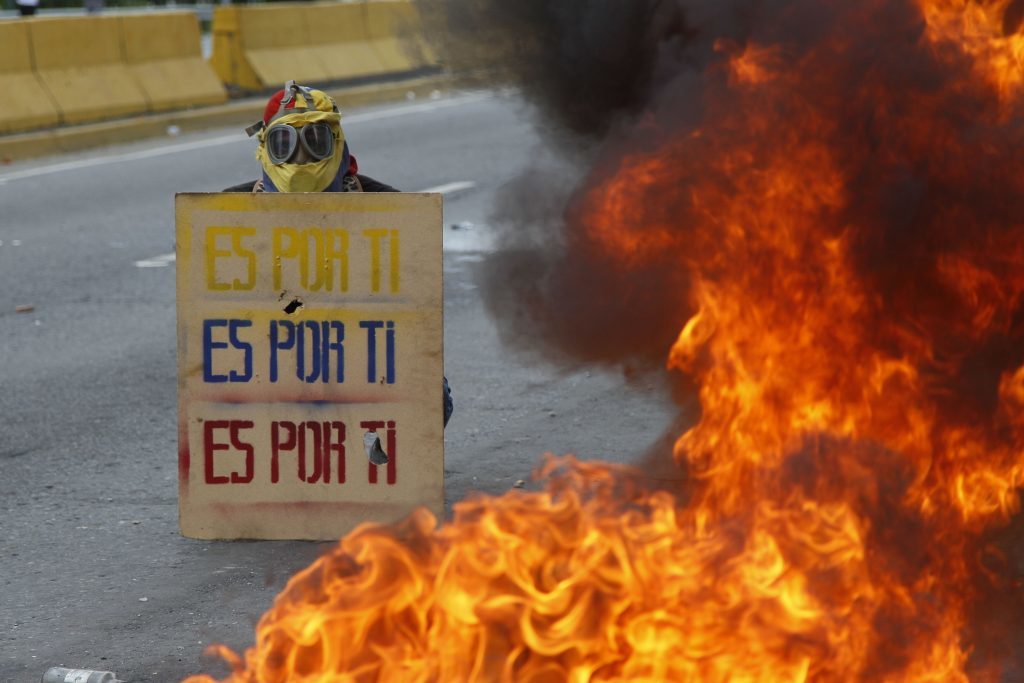
Jeremy Corbyn is under pressure to personally condemn Venezuelan president Nicolas Maduro amid violence in the South American state that has seen the families of British embassy staff withdrawn.
Foreign Secretary Boris Johnson has accused Mr Maduro of behaving like the “dictator of an evil regime” as he appeared to crack down on his enemies after a widely disputed vote.
In the wake of the poll that gave his ruling socialist party nearly unlimited powers security agents seized two opposition leaders from their homes at night.
As fears over civil unrest and instability in the country grew on Tuesday, the Foreign Office said it had withdrawn the families of its embassy staff and instructed Britons that they should consider leaving too.
Labour MP Angela Smith, who according to The Times has joined a new all party parliamentary group on Venezuela, told the Press Association: “I think Corbyn needs to condemn the actions of the Venezuelan regime, which are a very serious threat to democracy in that country.”
Graham Jones, another Labour MP and chairman of the group, told The Times: “I believe everybody in the Labour Party should condemn the Venezuelan regime because the first duty of any state is to look after its citizens. Venezuela has failed.”
Liberal Democrat leader Sir Vince Cable and Tory MP Mark Pritchard also called for Mr Corbyn to break his silence on the Venezuelan regime he has previously supported under socialist Hugo Chavez and his successor Mr Maduro.
A spokeswoman for the Labour leader said the party’s position was made clear in a statement on Monday from shadow foreign minister Liz McInnes.
Ms McInnes urged “the government of Venezuela to recognise its responsibilities to protect human rights, free speech and the rule of law” and said Mr Maduro must “respond personally to the legitimate concerns of the international community about the increasingly authoritarian nature of his rule and the growing hardship facing his people”.
The spokeswoman for Mr Corbyn said: “The Labour Party’s statement on Monday made clear our position on the importance of the respect for the rule of law and human rights. We’re watching the situation and developments in Venezuela closely.”
Mr Maduro called the vote for a constitutional assembly to overhaul Venezuela’s political system in May after a month of protests against his government, which has overseen the country’s descent into a devastating crisis during its four years in power.
Plunging oil prices and widespread corruption have left the formerly prosperous nation struggling with widespread shortages of food and medicine.
On Tuesday relatives and allies of two of the country’s leading opposition figures – Leopoldo Lopez and former Caracas mayor Antonio Ledezma – reported on social media that they had been detained by the state.
Both had recently posted videos online criticising Mr Maduro’s decision to hold the vote for a constitutional assembly.
The South American country’s National Electoral Council has said more than eight million people voted to grant Mr Maduro’s government the powers with the assembly, but the turnout is disputed by political opponents.
Mr Johnson tweeted: “Maduro acting like a dictator of an evil regime and has destroyed Venezuelan economy, eroded human rights + imprisoned thousands”.
In another post, he added: “Hundreds have died during protests against Maduro’s actions. Political prisoners must be released + rights, freedoms + democracy respected.”
On Tuesday the Foreign Office said: “As of the 1 August, all dependants of British Embassy staff have been withdrawn.
“You should consider leaving the country by normal commercial means.
“There’s a risk of significant disruption to transport links in and out of the country. If the political situation worsens, the British embassy may be limited in the assistance that it can provide.”
The United States has reacted to the election by imposing financial sanctions on Mr Maduro, who Donald Trump’s national security adviser H R McMaster also described as “a dictator”.
But the Venezuelan president remained defiant, insisting on national television that the sanctions “don’t intimidate me for a moment”, adding: “I don’t listen to orders from the empire, not now or ever.”